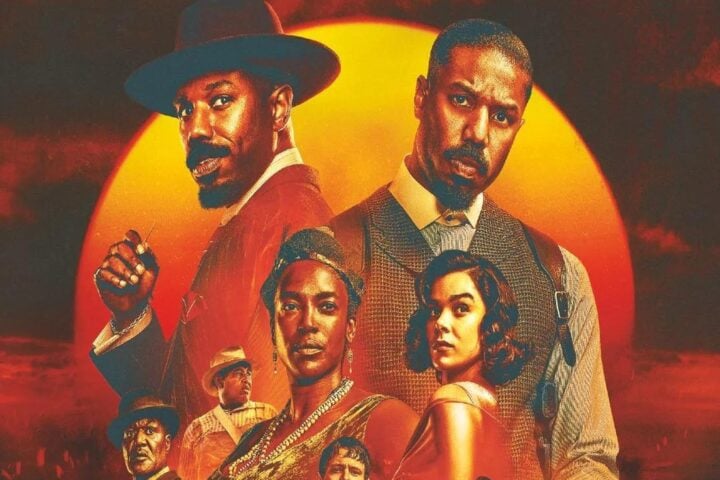Sam Taylor-Johnson’s Back to Black begins in Camden Town, in north London, where a teenage Amy Winehouse (Marisa Abela) flourishes in a family full of musicians. The most important influence on her is her nan, Cynthia (Lesley Manville), from whom she inherits her vintage style and love of jazz. We first see Amy taking to the stage in a local bar to perform “Stronger Than Me,” a song mocking her then-boyfriend for his lack of machismo with regrettable lines like “Feel like a lady, and you my ladyboy” and “Are you gay?”
It’s a triumphant night, with Amy crooning happily while the crowd laps it up. While it’s hardly a scandal that an 18-year-old wrote some dumb lines about a guy she was sick of, it’s more than a little regressive for a 2024 movie to show them off in such a positive way. Regardless, the song is a hit and the film rattles through the rapid ascent that followed, as Amy secures her first record deal and releases her acclaimed 2003 debut album, Frank.
Music biopics often live and die in their casting decisions, but Abela’s performance is neither a major success nor a terrible failure. She does a respectable job imitating Winehouse’s unique vocal style, even if you’re never in danger of mistaking it for the real thing. Her attempts to copy Winehouse’s on-stage mannerisms always seem a little forced, emphasized too much to be natural. She has charisma but not of the voltage or volatility that the singer had in real life.
The filmmaking doesn’t offer Abela much help when she’s on stage. From the night that Winehouse won five out of six trophies at the 50th Grammy Awards to her famous Glastonbury performance, Back to Black provides a lengthy highlights reel of the singer’s most famous performances, all of which are recreated faithfully but flatly. Visually, it never does anything to capture Winehouse’s captivating energy. Instead we get slavishly photocopied versions of iconic shows, the real versions of which are all readily available on YouTube.
Off stage, Amy has her head turned by Blake Fielder-Civil (Jack O’Connell), a smooth-talking geezer with a Cheshire-cat grin who introduces Amy to the musical stylings of 1960s pop group the Shangri-Las, as well as to hard drugs. The two of them quickly fall into a turbulent romance which consumes Amy’s life and most of Back to Black’s running time.

Blake, played with a sleazy charm by O’Connell, is treated rather kindly by the filmmakers. His relationship with Amy is presented as a doomed romance but one unquestionably driven by genuine love. The film, which takes its name from Winehouse’s second and final studio album, even goes out of its way not to blame Blake for his part in Amy’s drug problem. Amy’s father, Mitch (Eddie Marsan), also gets a comfortable ride here, shown as a doting dad who did all he could to save his daughter from herself. Both of these depictions are a far cry from the ones in Asif Kapadia’s 2015 documentary Amy, where the men are presented as a pair of grasping opportunists who contributed heavily to the singer’s misery and, arguably, her death.
The only people in the film who are really shown to be worthy of condemnation are the paparazzi who hound Amy every time she leaves the house. A faceless mass of parasites, they make a satisfying target for the audience’s rage but also a disingenuous one. Like so many other talented people, she was devoured by an avaricious industry, a callous culture, and an array of self-interested allies. But Back to Black isn’t really willing to dig into any of this, presenting Winehouse’s demise with a sad shrug, as one of those tragic things that just sort of happens.
The singer’s bulimia, her propensity for self-harm, and the extent for her drug problem are all similarly gestured to or mentioned in passing. This all could be seen as a commendable attempt to focus on her artistry rather than her pain, except we see very little of Amy’s creative process, or her collaboration with other musicians, though there are plenty of lines scattered throughout Back to Black in which Amy explicitly reflects on big topics like life, love, and art. Abela struggles to make these philosophical musings sound authentic, but the blame here really lies with the script. Those musings are by and large the sort of empty aphorisms you might find in a ghostwritten celebrity memoir, offering no real insight into Winehouse’s vision of the world.
Bizarrely, the one thematic thread that Back to Black does seek to tie its tale together with is the singer’s desire to have a child. Her maternal yearnings are referenced constantly throughout Taylor-Johnson’s profoundly cowardly film and, in one gloomy later scene, Amy looks on distraught as Blake checks the results on a pregnancy test and shakes his head. Back to Black ends with Amy learning that Blake has had a child with a different partner. She looks devastated as she cries and then ascends quietly up a staircase bathed in ethereal sunlight, before the camera moves over to solemnly rest on the image of a caged songbird. Hackneyed, heavy-handed symbolism aside, it’s an insulting way to conclude this biopic—reducing the entire story of an utterly unique and endlessly complicated person to little more than a sexist trope.
Since 2001, we've brought you uncompromising, candid takes on the world of film, music, television, video games, theater, and more. Independently owned and operated publications like Slant have been hit hard in recent years, but we’re committed to keeping our content free and accessible—meaning no paywalls or fees.
If you like what we do, please consider subscribing to our Patreon or making a donation.





